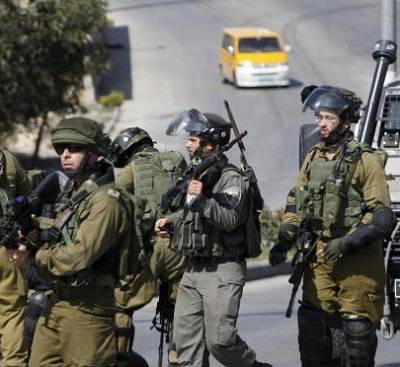An Israeli soldier convicted of manslaughter for shooting dead an injured Palestinian was freed from prison on Tuesday, the army said, after spending nine months behind bars.
Elor Azaria was initially sentenced to 18 months in prison for the killing of Abdul Fatah al-Sharif in the occupied West Bank city of Hebron in March 2016. He began serving his sentence on August 9.
The army's chief of staff, Gadi Eisenkot, later reduced the term by four months. Moreover, Israeli prisoners often have their sentences reduced by one third for good behaviour.
The army had previously said that Azaria, 21, was due to be released from the Tzrifim military prison near Tel Aviv on May 10.
According to Israeli media, he was freed two days early to allow him to attend his brother's wedding on Wednesday.
'War criminal'
The shooting incident was caught on video by B'Tselem, an Israeli human rights group, and quickly spread online.
It showed al-Sharif, 21, lying wounded on the ground, shot along with another Palestinian after allegedly stabbing and wounding a soldier.
Around 11 minutes after the initial shooting, Azaria, a sergeant and military medic at the time of the incident, walked up to al-Sharif and shot him in the head without apparent provocation.
He said he feared al-Sharif was wearing an explosive belt and could blow himself up, a claim judges rejected.
"His motive for shooting was that he felt the terrorist deserved to die," Judge Colonel Maya Heller said at the time as she dismissed Azaria's defence and rebuked his lack of remorse.
Al-Sharif's family said that Azaria had carried out a "cold-blooded execution", not manslaughter. They also pointed out that the soldier's sentence "is less than [what] a Palestinian child gets for throwing stones".
Issa Amro, director of the Hebron-based Youth Against Settlements activist group, previously told Al Jazeera that a sentence of 18 months in jail "is not proportionate with what [Azaria] did".
"We are talking about a war criminal, according to international law," he said.
The UN human rights office had also weighed in and described Azaria's sentence as an "unacceptable" punishment for "an apparent extrajudicial killing".
Official support
The trial had caught the attention of the Israeli public, with politicians weighing in with their opinions, including Prime Minister Benjamin Netanyahu, who had called for Azaria to be pardoned.
Speaking to reporters on Tuesday, Netanyahu said of the soldier's release: "I'm glad this event has come to an end."
Minister of Education Naftali Bennet followed suit and expressed his support of Azaria's release.
"It's so good to have you home!" he wrote on his Twitter account.
Minister of Transportation and Intelligence Israel Katz called for Azaria's criminal record to be erased.
"I appeal to President Reuven Rivlin to act now to delete Elor's criminal record so that he can integrate into civilian life and get on with his life," he said.
Al-Jazeera


 Home
Home Discover Islam
Discover Islam Quran Recitations
Quran Recitations Lectures
Lectures
 Fatwa
Fatwa Articles
Articles Fiqh
Fiqh E-Books
E-Books Boys & Girls
Boys & Girls  Articles
Articles










